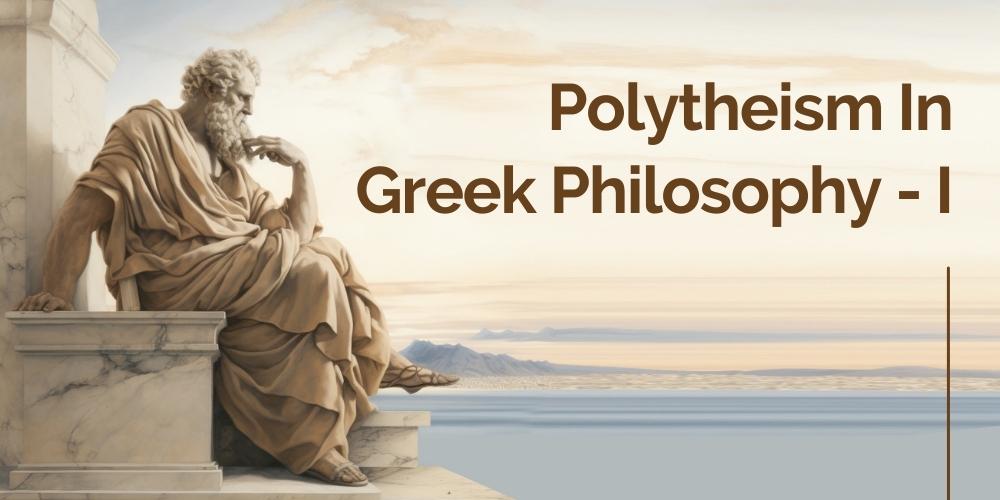
Polytheism in Greek Philosophy-I
This INDICA Course, the inaugural module in our series on Polytheism in Greek Philosophy, challenges the common perception of philosophy as a march of ‘reason’ distancing itself from religion and spirituality, particularly from polytheism.
Contrary to this view, it’s worth noting that the acknowledged founders of Western philosophical tradition—the ancient Greek philosophers—were polytheists. They worshipped numerous Gods of their Hellenic heritage, not as a simple nod to popular sentiment, or as a transition to a more ‘enlightened’ monotheism or atheism. Their writings clearly reflect this belief, while any contrary argument necessitates attributing to them views they did not hold. These philosophers endeavoured to grasp the essence of communion with the divine, the blessedness of the Gods, and how humans could partake in it. They sought to illuminate the myths and rituals of their tradition with the light of their knowledge about the nature of Gods and the role of worship, beyond the tangible things we pray for—essentially striving to understand what it means to be with the Gods.
Our series on Polytheism in Greek Philosophy invites you on a journey through myths, instilling an appreciation for their wisdom, and the works of philosophers, helping to grasp key concepts they used to conceptualize the nature of the Gods, such as unity and multiplicity, immortality, beauty, and cosmic order.
The course features studies of poets who drew inspiration from the Muses, tragedians who paid homage to Dionysos, and thinkers who saw theoretical speculation as the highest form of devotion. It spans thinkers from the Archaic, Classical, Hellenistic, and Late Antique periods, including the Platonists who confronted Christian hegemony and formulated a theological framework unparalleled in its sophistication. The course aims to initiate you into Hellenic polytheist philosophy and theology, offering a deep dive into the sacred myths themselves.
Faculty
26 August 2023 - 9 December 2023
8:00 PM IST-9:00 PM IST
Every Saturday
Introduction
The primary aim of our first module, Polytheism in Greek Philosophy – I, is to facilitate an understanding of the inherent logic within Hellenic myths. These myths serve as the foundational bedrock for the evolution of Hellenic metaphysics, explaining how Gods are individually revered, how the pantheon is structured, and how the multitude of Gods is envisioned by poets. It also explores the intrinsic diversity within the corpus of myths.
The course endeavors to elucidate the nature of the relationship between the Gods and the cosmos, highlighting how cosmic order is birthed from the order that the Gods themselves establish. We’ll examine the dynamic between Gods and mortals, encompassing both heroic figures and ordinary devotees.
This module essentially serves as an introduction to the theological interpretation of myths, equipping learners to decode myths for their teachings about the nature of the Gods and existence at large. This requires the cultivation of sensitivity towards symbolism and the development of skills to interpret these texts in a manner that respects the inspirational role of the Muses, both in the inception of these myths and in their ongoing exegesis. Importantly, the ability to interpret symbols, once mastered, can be extended to the sacred myths of other traditions as well.
Course Objectives
This course lays the foundation for subsequent courses in the series by illustrating the sophisticated, implicit philosophy already present within the myths themselves. This groundwork will help situate the devotional, polytheistic understanding of philosophical inquiry to be pursued later.
Course Outcomes
Students will learn how to approach myths from a theological, non-reductionist perspective, centered on the Gods and their eternal, cosmogonic activity.
Course Syllabus
- Hesiod’s Theogony: Establishing the Olympian Regime
- Hellenic Epic: Heroic Being
- Hymns: Celebrating the Gods
- Orphica: Esotericism and Salvation
Reading List
- Hesiod, Theogony
- Homer, Iliad and Odyssey
- D. M. Smith, The Cypria
- The Homeric Hymns
- Orphic Fragments
Course includes
- Live sessions
- Access to class recordings (for asynchronous participation)
- Certificate of Completion upon successful course completion

